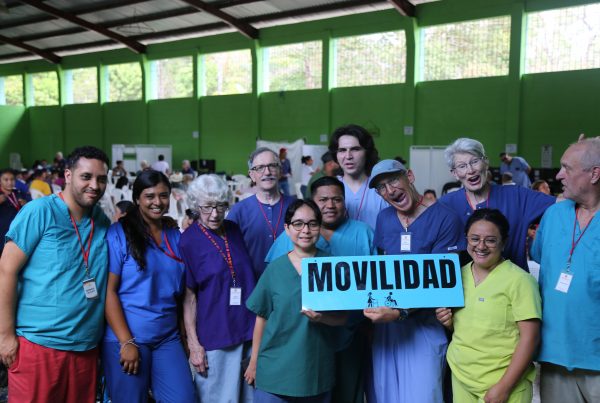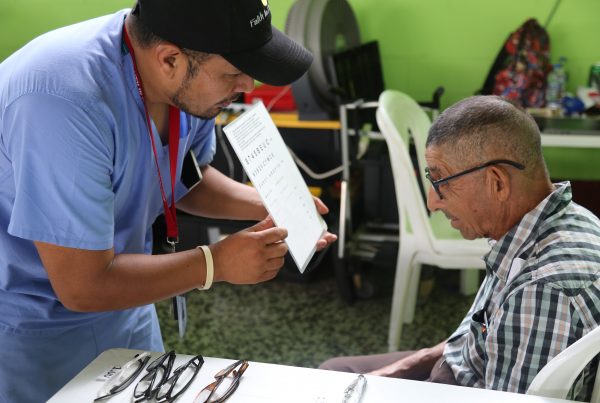Day 3
Special visitors make it to our clinic today.
Another daunting challenge ahead of us, but we’re over the hump and into the last two days of our mission! Our joyous and seasoned leadership team encouraged us during our devotionals to finish the week strong and give each patient the same attention today that we have extended to each person the first two days!
The day was hotter and drier than yesterday; a struggle to keep everyone hydrated, and taking our breaks was more important than ever. Early on it looked like there might be a lighter caseload (we eventually came in at 238, just below our target of 250). That didn’t keep complicated cases at bay, though. One of our clinicians from General had to make the decision to send, not one, but two patients in respiratory distress to the hospital in ambulances, which was one hour away. It was a crisis, but another example of some improvements in even rural health care in Guatemala.
Looking for a diversion from the heat, our treat for the day was an extended visit by Dr. Ben Adesope, the new CEO of Faith in Practice. Dr. Ben is based in Houston, but his desire to move more frequently between headquarters and the field where we work was realized today. We were grateful to be given the opportunity to meet this key member of the organization who only just joined Faith in Practice in mid-December. Visits to a few of our clinics and conversations with team members, patients, and local volunteers kept him busy for a few hours in the morning. Most of us had a chance to chat with him; the mobility team put him to work constructing a wheelchair for one of our patients, and he was able to share fellowship with us over both lunch and dinner and with extended conversations on our bus ride back to the hotel. Though initially reluctant to be in some photos (knowing that we might claim preferential treatment by being the first village team to be visited in the field!) it didn’t stop us grabbing a group shot with him which included the village locals, the Guatemalan FIP team, and our capable “Red Hat” volunteers. Thank you, Dr. Ben!
Today in Ob/Gyn Dr. Christi Hunt and her translator Teresa Iztas performed an ultrasound on a pregnant woman due with her second child. Our future mom wanted to know her due date, not having received any prenatal care or consultation with a physician or midwife. Our team reported that she was healthy and was half-way through gestation. According to Dr. Hunt, most women in village settings in Guatemala do not have ready access to or seek out prenatal care during their pregnancy. When asked what their plan for delivery is, they will respond they have a midwife coming to their home or they hope to show up at the nearest hospital when the time comes.
Ob/Gyn benefitted all this week from the clinical experience of a national leader for women’s health, Dr. Patty Baiza. When she’s not working ten-hour days in our village clinic, she is working to train midwives in Guatemala. She is the Medical Director of women’s health here, and a wonderful resource for us.
Women’s health care initiatives are developing slowly in Guatemala, and our village clinics still provide essential and welcomed resources to women of all ages. “Although this is not an ideal situation,” Dr. Hunt notes, “I feel fortunate to provide what little care I can for the women in Guatemala. Prevention of birth trauma and promotion of healthy prenatal care is the only way to achieve better outcomes in moms and babies here, and ultimately for their families and communities.” She looks across our clinic space and can see the lines of young patients forming up in our Mobility Clinic: The case load there is huge, but a number of those patients are this community’s children who have mobility issues stemming from previously mentioned birth trauma, and who require wheelchairs and other mobility assists to improve their quality of life. Dr. Phil Filbrandt (and his translator/interpreter Braden Barber from California) and Gayle Turner over in Mobility spend the day assessing these patients, addressing acute needs, and then hopefully finding them mobility enhancing tools that can increase their quality of life and home and in their communities. The mobility clinic gave out two pediatric wheelchairs to toddlers with cerebral palsy (CP), a population that Dr. Fillbrandt works closely with in California.
What would our patient care be without the ability to get a peek inside our patients without resorting to surgery? In our Ultrasound Clinic, Dr. Phebe Chen uses a portable ultrasound (US). It has the capability of doing many different types of studies. Including thyroid, breast, abdomen, vaginal, and prostate exams. Dr. Chen can also look for fluid collection in joints.
Early in the day, Dr. Chen performed an ultrasound on a newborn’s testicle. His family couldn’t feel it in the normal place. Dr. Chen wanted to see if this newborn was missing a testicle or if it was undescended. Luckily, she found it up in his groin. It wasn’t a surgical referral but, she recommended a follow up in six months to make sure it properly descends.
Dr. Chen also saw a forty year old woman with a breast mass. The patient had felt a mass in her breast which grew over a period of three months. Since this patient had never had a mammogram, she wanted to know if she needed treatment for breast cancer or had a benign tumor. Dr. Chen delivered some unfortunate news. The ultrasound did indeed show a suspicious mass for a primary-site breast cancer (but it didn’t appear to have metastasized). Our patient was referred for biopsy and will likely surgery. Fortunately, this patient knew to seek out medical attention which is not a course of action that everyone either thinks about or has access to. Because there are no primary care doctors to give annual breast screenings for women to detect potential breast cancers early, these Faith in Practice village clinics are typically the place they receive such care should they be fortunate enough to get a spot in our clinic.
Another fascinating case: Dr. Chen examined a young man referred over from one of our other clinics who had received prior corrective surgery on his thigh, but which now had developed into a draining wound. Without an ultrasound to provide insight, the wound would have festered, and eventually caused an infection in the bone. That would have required surgeons to remove the hardware supporting his bones, which would have been a lot more serious. Our team referred this patient out to get the fluid drained before it could get into the bone. Very likely this visit today and referral improved this man’s quality of life dramatically.
We saw many complicated cases today; many more than in previous years since our triage priorities in the months leading up to each village clinic is to see as many potential surgical referral patients as possible. But complicated cases are time-consuming at the same time that they provide the best chances for meaningful interventions. That’s a philosophy of patient care and service that everyone, including our new CEO, can get behind.
In spite of the feeling that we all have of a job well done, the days are starting to blurrrr together. I miss espresso…
With Love from an Angelino in Guatemala
Eleanor, Team Blogger


















